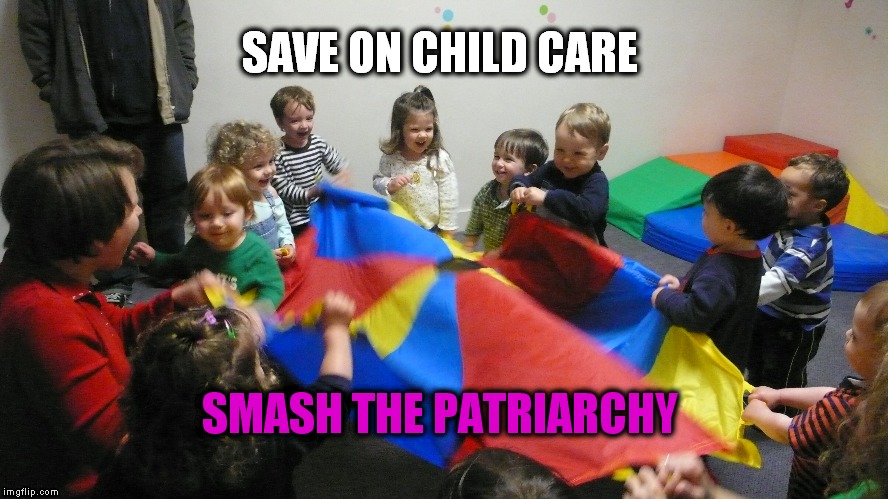Over 30 years of anarchist writing from Ireland listed under hundreds of topics
Save on Child Care: Smash the Patriarchy!
 Child-care in Ireland is so expensive because it is so undervalued. Only through care-workers’ collective withdrawal of labour will those who rely on us realise how vital our work is.
Child-care in Ireland is so expensive because it is so undervalued. Only through care-workers’ collective withdrawal of labour will those who rely on us realise how vital our work is.
Across the European Union, childcare costs around 12% of a family’s income, but in Ireland, it accounts for over 35% [1]. Where does that money go? With most childcare employees on minimum wage, it isn’t going to ordinary care workers. At a protest outside Leinster House in February, 2015, the Association of Childhood Professionals estimated that there are around 25,000 people in the early childhood workforce on an average pay rate of less than €11 an hour [2].
Expensive childcare seems to be a result of the intersection of capitalism (the for-profit logic embedded in private crèche operations) with gendered or patriarchal (male-dominating) norms. These priorities and forms of domination are reflected in state policy: Ireland has one of the lowest public expenditures on childcare and early education provision in the EU. As care work is devalued in society, devalued work becomes the work of those already discriminated against. Ireland’s use and abuse of migrant au pairs is but one example, with women of colour often providing full-time and flexible childcare in homes across the country “for a fraction of minimum wage, with the average au pair being paid just €100 for at least 40 hours of childcare and domestic duties per week” [3].
Expensive childcare has all kinds of negative consequences. In Ireland, it tends to result in women leaving the workplace in favour of work in the home. A recent study has suggested that more than 3,000 new mothers leave the workforce annually [4]. For women, expensive childcare and the decision to become/remain home-makers ensures unequal division of housework, unequal career progression as well as unequal earning-power when compared to men. It also tends to ensure that women in housework or caring roles have less free time to engage in political activity, with the result that many spaces and institutions, including activist ones, tend to be overwhelming shaped by men.
According to the Global Women’s Strike [5], women and girls perform nearly two-thirds of the work in most given households. This work includes physical labour such as washing dishes, doing laundry, vacuuming, etc. but also emotional labour such as sending out birthday cards, organizing family vacations, preparing for holidays, etc. Much of this work in the household, while at times is referred to as a “second shift,” remains unpaid. It is also not included in a country’s Gross National Product or Gross Domestic Product, although women’s unpaid labour is estimated at nearly $11 trillion.
What should we do to better recognise the importance of care work? How can we organise to achieve a fair division of care work in our society?
Responses tend to divide according to their understanding of the problem. Among those who see the issue as government policy and who seek political representatives to change things, there are demands for reforms and increased spending. The Association of Childhood Professionals want the Government to accept responsibility for sufficient funding to adequately resource all areas of childcare and childhood education - and to increase spending on this area from 0.1% of GDP to 0.7% [2].
Among those who seek a deeper transformation of society, there are no political representatives to be relied on. Instead, we grow our own solidarity networks and struggles for freedom through our own initiatives and direct actions. The Global Women’s Strike movement points in this direction. Our collective withdrawal of labour will compel those who rely on us to realise how vital our work is. At the 2014 Dublin Anarchist Bookfair, Selma James, a key organiser within the Global Women’s Strike movement, spoke about how the current economic crisis has impacted unevenly across genders, discussing the intersection of austerity, care-work and women’s reproductive rights. The link is provided below [6]
WORDS: Tom Murray
REFERENCES
Photo Attribution: "Kids at daycare" by Grant Barrett from San Mateo, California, United States - Guthrie at daycare. Licensed under CC BY 2.0 via Wikimedia Commons - https://commons.wikimedia.org/wiki/File:Kids_at_daycare.jpg#/media/File:...
[1] ‘Childcare costs under microscope as Ireland has highest in EU’. Breaking News.ie, 5 March 2015
[2] Childcare workers in call for investment in sector, RTE, 17 February 2015.
[3] Au pairs ‘used as cheap childcare’ and can be underpaid, exploited. The Journal, 21 October 2014.
[4] Noel Baker, ‘Childcare costs forcing mothers out of workforce’, Irish Examiner, 16 April 2015.
[5] See http://www.globalwomenstrike.net/
[6] “Care & Social Reproduction - Audio or Video of Selma James & Conor McCabe at DABF 2014” at http://www.wsm.ie/c/care-social-reproduction-selma-james-conor-mccabe

